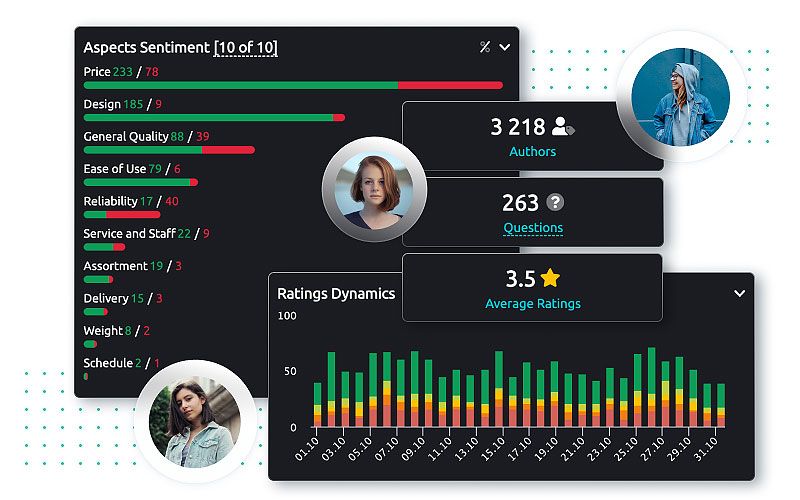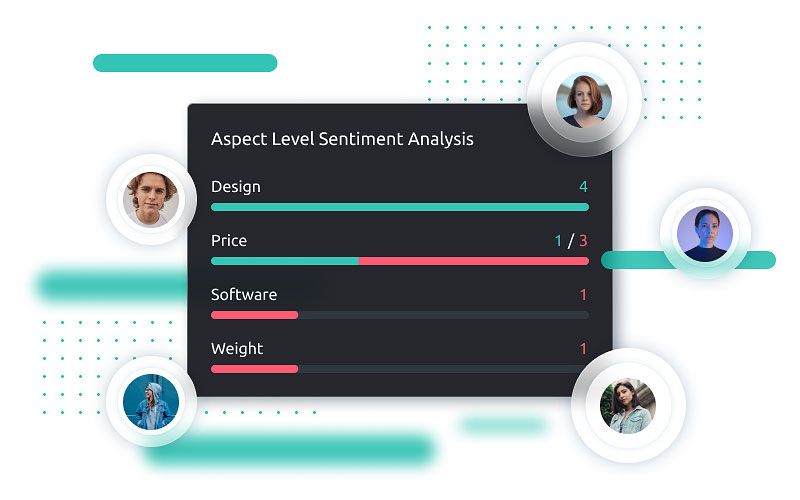In today's data-driven business landscape, understanding the nuances of customer sentiment is one of the keys to unlocking growth and success. Welcome to the world of Aspect Based Sentiment Analysis (ABSA), a cutting-edge technology that doesn't just scratch the surface of sentiment but dives deep into the specifics, providing businesses with actionable insights that can shape strategies, products, and services.
In the fast-paced world of business, staying attuned to customer opinions is essential for success. That's where sentiment analysis, a powerful natural language processing (NLP) technique, comes into play. Sentiment analysis, also known as opinion mining, is the automated process of deciphering the emotional tone within text data. Whether it's customer reviews, social media comments, or news articles, sentiment analysis helps businesses understand the sentiments expressed – whether they are positive, negative, or neutral. Using cutting-edge machine learning algorithms and linguistic analysis, it enables organisations to gain critical insights into the emotional context of the text. This valuable tool has a wide range of applications, from marketing and customer service to market research and brand management.
Levels of the Game
Nowadays sentiment analysis goes beyond understanding whether a customer review is positive, negative, or neutral; it can delve deeper into the nuances of opinions and emotions. To get a wider picture, let's explore three levels of sentiment analysis: Message Level, Entity Level, and Aspect Level, each offering a unique perspective to unlock valuable insights and drive business success.

1. Message Level Analysis:
At the foundational level, Message Level Analysis is all about determining the overall sentiment of a piece of text. Whether it's a product review, a social media post, or a customer email, this approach provides a high-level view of the sentiment expressed in the entire message. It's a baseline to gauge the general sentiment towards your brand, product, or service. However, it doesn't dive into the specifics of what aspects or entities within the text are driving those sentiments.
2. Entity Level Analysis:
Stepping up the sophistication ladder, Entity Level Analysis takes a closer look at the subjects or entities mentioned within the text. These entities can be people, products, companies, or any other named objects. This level of analysis not only identifies the sentiment associated with each entity but also helps in understanding the relationships between entities. For instance, it can reveal how customers feel about a specific product within large category. This information is invaluable for businesses looking to fine-tune their strategies and offerings.
3. Aspect Level Analysis:
Now, let's talk about the most granular and insightful level of sentiment analysis: Aspect Based Sentiment Analysis or ABSA. This approach breaks down the text into its constituent aspects or features. It assesses sentiment at a highly specific level, such as the performance of a smartphone's camera, the taste of a restaurant's food, or the efficiency of a customer support team. Aspect Based Sentiment Analysis not only tells you whether customers are happy or unhappy but also pinpoints the exact aspects driving those sentiments. This level of granularity is a treasure trove of insights for businesses, enabling them to identify areas for improvement, prioritise features, and make data-driven decisions.
Aspects of Success
ABSA becomes especially handy when you have a multitude of products and you want to know precisely what garners praise and what ignites controversy. Imagine launching a new watch model – a sleek and stylish design that's received rave reviews. But, alas, there's a hitch. People are eager to get their hands on it, yet they're left frustrated, unable to find it anywhere, and are met with promises of having to wait for the next supply batch. On the other hand, think about the scenario where the waiting times in one of your bank branches have become unbearably long, leading customers to vent their frustration on every available platform.

All of this is the case for lots of SemanticForce customers. This is why we have developed sophisticated tools that collect data from nearly all types of <media>, including online news outlets, blogs, forums, review websites, e-commerce platforms, and all major social networks. We utilise this information to assess it with ABSA algorithms and present it in the form of user-friendly dashboards that streamline your data analysis efforts and gain an instant and holistic understanding of your market landscape. Let's look closer into how this may be relevant for a variety of quite different industries.
1. ABSA for Pharmaceutical Enterprises:
As already mentioned, ABSA takes sentiment analysis to the next level by not just categorising content as positive, negative, or neutral but by breaking it down into specific aspects. In the pharmaceutical realm, this means scrutinising feedback on drug efficacy, side effects, packaging, pricing, and more. By dissecting these aspects, companies gain a comprehensive understanding of what's working well and where improvements are needed.
For example pharmaceutical group can leverage our platform to track the digital footprint of its pain-soothing medicine. Just a few dashboards enable the client's team to see the spikes of unusual activity and look into them closely, identifying sources, aspects of the product that are being mentioned, predominant tone and geographical distribution of the feedback. They know in which country and on which platforms customers are praising the instant pain-relief of the medicine, and where potential buyers have trouble finding it in drug stores.

As you can see, ABSA offers several distinct advantages for pharmaceutical businesses. It enables them to respond swiftly to emerging trends and concerns, allowing for agile adjustments in product development and marketing strategies, and fosters a stronger connection with patients and healthcare providers, as it showcases a commitment to actively listening and addressing their needs.
2. ABSA for Automotive Industries:
As it is the case for pharmaceuticals, implementing ABSA algorithms in the automotive sphere translates into a granular examination of feedback related to vehicle performance, safety, design, pricing, customer service, and more. By breaking down these aspects, companies gain a 360-degree view of what customers appreciate and where improvements are needed.
Aspect Based Sentiment Analysis empowers automotive businesses to stay ahead of market trends by identifying emerging concerns and preferences. This agility allows for nimble adjustments in manufacturing, design, and marketing strategies. ABSA aids in quality control, helping manufacturers pinpoint potential issues early in the production process, thereby reducing costly recalls and ensuring safer vehicles on the road. Also ABSA fosters a stronger connection with customers. It demonstrates a commitment to actively listening to their needs and acting upon their feedback, ultimately leading to enhanced brand loyalty.

Complex products like cars require a higher level of analysis. For instance, dashboard related to recently launched electric car model, provides insights into 52 aspects commonly mentioned in online feedback about this vehicle. These aspects range from general factors like Design, Price, and Quality to more specific ones like Digital Mirrors, Soundproofing, and Environmental Impact. In the competitive world of modern car sales, it's no longer sufficient to determine whether these cars are good or poor. To truly stay competitive, you need to understand what sets them apart from the competition and what areas need improvement. This is where ABSA shines even brighter, as Message and Entity Levels of Sentiment Analysis often fall short in such cases.
3. ABSA for Hospitality:
In the fast-paced world of the hospitality industry which is heavily dependent on clients' feedback, meeting and exceeding customer expectations is paramount. That's where Aspect Based Sentiment Analysis comes into play. For example, it helps our clients to provide real-time feedback to its guests and tailor services to their preferences, ensuring a top-notch experience.
Automated tools help our client to find and highlight online feedback that requires an urgent reaction responding to it across all channels from a unified platform. Implementation of artificial intelligence optimises operational efficiency and response times allowing to handle tasks more effectively. And addressing complaints and issues swiftly elevates customer satisfaction and loyalty, all thanks to the insights provided by ABSA.

Limits of Technology
As you can see, ABSA allows organisations to gain deep insights into customer sentiments, understand specific aspects of their products or services that require attention, and enhance overall customer satisfaction. However, like any technology, ABSA comes with its own set of limitations.
One of the primary challenges ABSA faces is its ability to grasp nuanced language and context. While it excels in identifying sentiments related to specific aspects of a product or service, it may struggle with sarcasm, slang, or cultural references, leading to misinterpretation. Also in cases where customer feedback contains ambiguous or contradictory statements, ABSA may struggle to provide clear insights, making it challenging for businesses to take decisive actions.
The accuracy of ABSA heavily relies on the quality of the data it is trained on. If the training data is biassed or unrepresentative of the target audience, the analysis can yield inaccurate results. Another related problem is that even Aspect Based models may have difficulty with industry-specific jargon or new terminologies, requiring constant updates to stay relevant.
Nevertheless, with advancements in machine learning and natural language processing, ABSA algorithms are continually improving their accuracy and ability to understand context. This paves the way for more precise insights into customer sentiments. It is reinforced by the fact that businesses recognize the value of ABSA and are increasingly investing in customised models. Tailoring algorithms to specific industries and target audiences can lead to more accurate results and actionable insights.
In conclusion, while Aspect Based Sentiment Analysis has its limitations, it remains a powerful tool for modern businesses seeking to understand and improve customer satisfaction. As technology continues to evolve, we can expect ABSA to become even more accurate and insightful, providing businesses with the means to better meet the ever-changing demands of their customers. To fully harness the potential of ABSA, organisations should invest in data quality and customization. But the journey toward unlocking the full potential of ABSA is just beginning, and its future looks promising.
